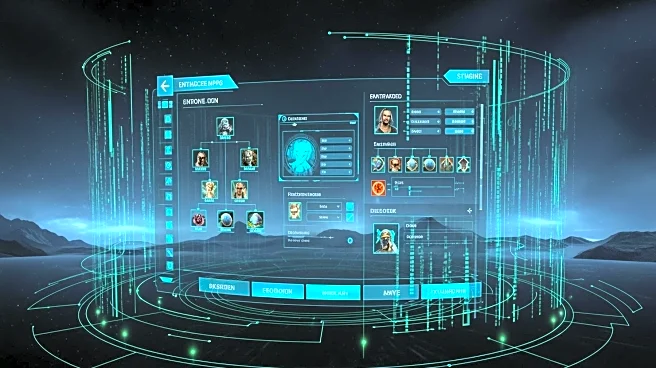What's Happening?
Obsidian Entertainment is gearing up for the release of The Outer Worlds 2, set to launch on October 29 for PlayStation 5, Xbox Series X/S, and PC. The development team has focused on expanding the game's scope and depth, addressing feedback from the first
installment. Director Brandon Adler highlighted the enthusiasm for the game's world and IP, which naturally led to the creation of a sequel. The team has prioritized larger game areas and extended gameplay length, responding to user research indicating a desire for more content. Creative director Leonard Boyarsky emphasized the removal of restrictions present in the first game, allowing for deeper RPG reactivity and more complex player interactions. The sequel aims to offer detailed character creation and progression, with the game world reacting dynamically to player choices and stats.
Why It's Important?
The Outer Worlds 2 represents a significant step for Obsidian Entertainment in refining its RPG offerings. By addressing player feedback and expanding the game's scope, Obsidian is likely to strengthen its position in the competitive gaming industry. The enhancements in character development and world reactivity could attract a broader audience, potentially increasing sales and market share. The game's success may also influence future RPG development trends, encouraging other studios to prioritize player-driven narratives and expansive game worlds. For players, the improvements promise a more immersive and personalized gaming experience, enhancing engagement and satisfaction.
What's Next?
As The Outer Worlds 2 approaches its release date, Obsidian Entertainment is likely to continue promoting the game's new features and improvements. The reception of the sequel will be closely watched by industry analysts and competitors, as it may set new standards for RPG development. Post-launch, Obsidian may gather player feedback to inform future updates or expansions, ensuring the game remains relevant and engaging. The success of The Outer Worlds 2 could also pave the way for additional sequels or spin-offs, further expanding the franchise and its universe.
Beyond the Headlines
The development of The Outer Worlds 2 highlights the evolving nature of RPGs, where player agency and world-building are increasingly prioritized. This shift reflects broader industry trends towards more interactive and personalized gaming experiences. The removal of previous game restrictions suggests a commitment to innovation and creativity, potentially influencing how other studios approach game design. Additionally, the focus on detailed character progression and world reactivity may encourage discussions on the ethical implications of player choices and their impact on virtual environments.














